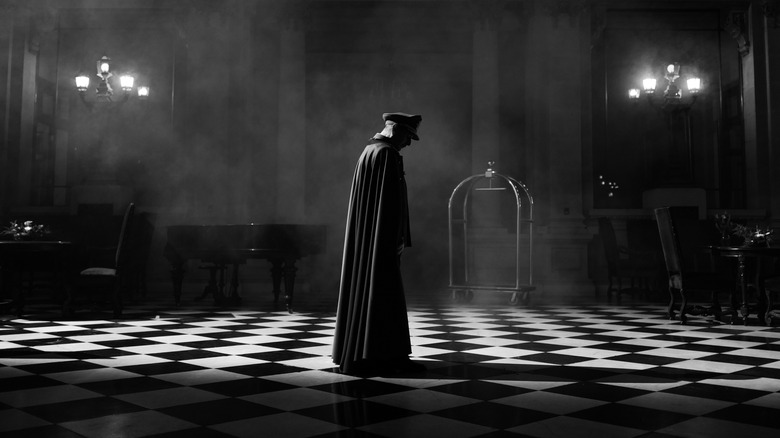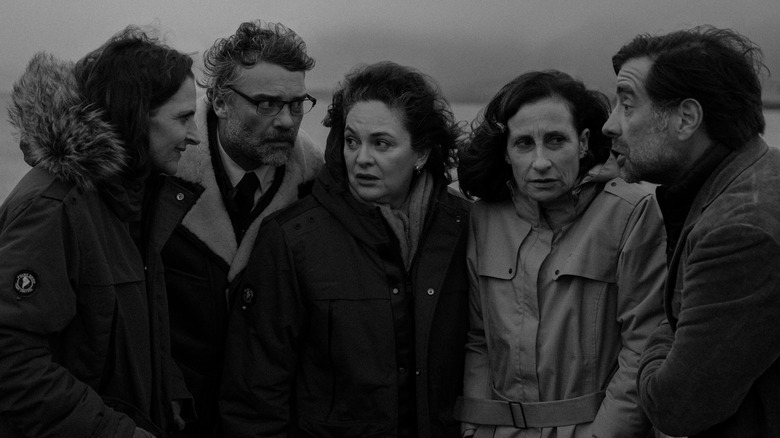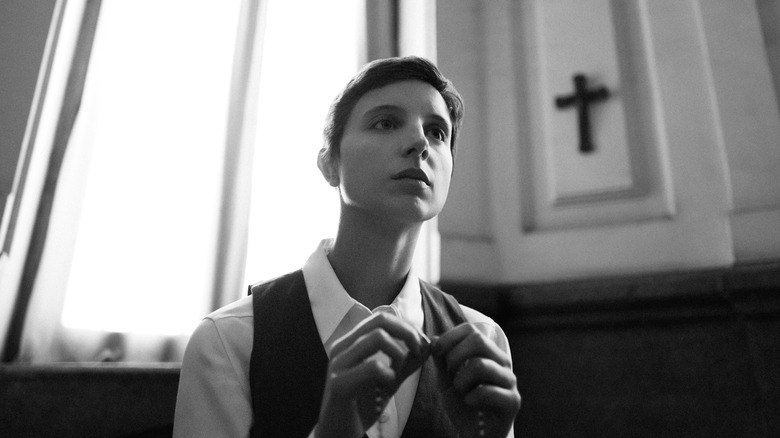El Conde Review: The Boldest Vampire Movie Of The Year Needed Just A Little More Bite
This piece was written during the 2023 WGA and SAG-AFTRA strikes. Without the labor of the writers and actors currently on strike, the movie being reviewed here wouldn't exist.
Traditionally speaking, vampire stories have boasted a unique kind of versatility that most other subgenres can only dream about. In the last decade alone, they've run the gamut of high-water marks like Taika Waititi's mockumentary "What We Do In The Shadows" and Jim Jarmusch's soulful "Only Lovers Left Alive" to epic lows such as "Dracula Untold," "Morbius," and, well, take your pick of literally any of the "Underworld" movies. 2023 alone has seen two "Dracula" adaptations debut with various degrees of success, but the last quarter of the year brings us the most distinct and boundary-pushing vampire flick, by far — courtesy of one of the most unexpected sources imaginable.
Leave it to filmmaker Pablo Larraín and the evocative black-and-white "El Conde" (meaning "The Count") to filter his biopic sensibilities through the prism of, "What if we reimagined the most monstrous dictator in the history of Chile as a centuries-old vampire?" Obviously conceived as a modern, brutal, and oftentimes wickedly deadpan takedown of the horrific military leader Augusto Pinochet (as befits the director behind the sneakily-haunted drama "Spencer," horror and laughs typically blend into one amorphous haze here), the satire nonetheless feels frozen in a distant point in time — the scars left on Larraín's home country throughout the dictatorial regime, spanning 17 years of terror, all but petrified in amber. At times, the absurdist humor calls to mind the razorblade-like edges of 2017's "The Death of Stalin." Others, its deeply poignant sense of melancholy evokes Guillermo del Toro's recent take on "Pinocchio," set primarily (and pointedly) in fascist Italy.
Such feelings of sadness and anger permeate the tone in the early going, from when we're first introduced to 87-year-old actor Jaime Vadell as the shockingly aged Pinochet, a lonely and immortal husk of a vampire who no longer wants to keep faking his death and desperately wants the genuine article instead ... but cannot. Lurking around his old, decrepit country manse alongside his "only and most loyal" servant Fyodor (Alfredo Castro), Pinochet appears resigned to wasting away for all eternity in a foreign, contemporary world that has mostly forgotten the horrors he wrought in 1970s Chile and beyond — which wouldn't be so bad, he grouses, if only they'd remember him as a virile killer as opposed to something as petty and offensive as a thief. That distasteful label rears its ugly head more literally when his five inheritance-seeking children descend upon his home, spurred into action by reports of a certain flying, caped creature feasting on the hearts of locals in the nearby capital city of Santiago.
Such a potent setup would seem to bode well for an artist of Larraín's talents to craft something truly singular, but somewhere along the way "El Conde" bites off more than it can chew.
Bloodsuckers come in many forms
Subtlety isn't necessarily the name of the game in "El Conde," an alternate-history film where the ex-dictator is envisioned as a vampire born 250 years in the past. After discovering his latent taste for blood as a soldier in service of King Louis XVI and promptly becoming a deserter once the bloody French Revolution erupts, one can practically see his fierce hatred of revolutionary politics ossifying as he witnesses the beheading of Marie Antoinette. (These flashbacks are regaled to us by the film's unreliable and suspiciously invested narrator, whose identity results in one of the wildest third-act reveals you'll ever see.) It certainly won't fly over the heads of viewers when he lustfully licks the leftover blood left behind by the guillotined French monarch, makes off with her decapitated head, and uses her bourgeois legacy as motivation to commit all sorts of atrocities in the pursuit of savagery. (Such acts are not limited to war crimes, mind you, even as his nasty habit for puréeing the still-beating hearts of his victims with an ever-handy blender steadily turns into an unremarked-upon running gag of sorts).
Larraín doubles down on this with the arrival of Pinochet's utterly selfish brood and his distant wife Lucía (Gloria Münchmeyer), all of whom seem intent on proving that vampires come in many forms. Such blunt imagery tends to feel right in line with the aims of the script, co-written by Larraín and Guillermo Calderón. But trouble arises once it becomes clear that the story doesn't aspire to anything deeper or more profound than that.
For its almost two-hour runtime, "El Conde" never runs out of gorgeously-rendered shots framed and lit by cinematographer Ed Lachman ("Carol," "Dark Waters") or impeccable production design by Rodrigo Bazaes ... but even the most lavish sets and most theatrical interplay between gothic shadows and light (aided by the gorgeous classical score by Marisol García) amount to little more than window dressing when the film settles into a low-energy, largely plot-less middle act. The only real spark is provided by the arrival of Carmencita (Paula Luchsinger), a charming and utterly pious nun recruited by one of Pinochet's gaggle of grown-up children and tasked with sorting out their father's financial situation. Unbeknownst to most, however, she has her own secret agenda to exorcize the "devil" that she believes is in possession of Pinochet's soul — or what remains of it.
A great setup, but a toothless satire
For any of its missteps, nobody can come away from "El Conde" accusing Pablo Larraín of not knowing what he wanted out of this oddity of a project.
In perfect lockstep with his director, the aged performer Vadell subtly imbues Pincohet with an even worse fate than death — the essence of becoming obsolete. Even in the sparse moments when the film lets his focus stray from the crusty old man's wallowing (which never humanizes the monster so much as it only further villainizes him), surrounded by empty rooms and striking shadows and useless trinkets from his past "glories" littered all around him, the dictator's presence makes itself felt in the comings and goings of the supporting cast. While Castro and Münchmeyer get their moments to shine as the servant Fyodor and Pinochet's disaffected wife respectively, it's Luchsinger as Carmecita who makes up for the one-note parade of Pinochet's self-interested offspring and stands out as a total revelation. Not only is she involved in the standout sequence of the movie, when the push-and-pull between duty and seduction finally comes into focus in as sweeping a spectacle as a film of this scope and scale will allow, but her hilariously dry interviews of each member of the Pinochet household as she digs into their various misdeeds provide a much-needed backbone in an otherwise formless middle hour of the picture.
At its heart — or, rather, the chest cavity where a deliciously blood-filled heart should be — "El Conde" is all about the tension between how we remember the seediest moments of history and humanity's tendency to let villains off the hook in the long run. Passively forgetting about the fascists formerly in power, the film argues, doesn't have quite the same effect as proactively ridding ourselves of any lasting vestige of their harm. The slow-burning, frequently discomfiting, and even occasionally sexy story (all staples of a classic vampire yarn, naturally) resides most effectively in the space between simple allegory and fairy tale. Yet one can't help but look at the tools at Larraín's disposal and yearn for a more cutting and incisive fable — one with slightly sharper edges that never once feels defanged.
"El Conde" succeeds in transforming the typical uniform of a bloodthirsty dictator — the billowing cape and bat-like cap — into a downright vampiric avatar. Yet ultimately, the razor-thin premise can't quite sustain itself. Taken as a whole, the film is a bit like a vampire draining an older victim of their blood: cold, thick, and unnourishing.
/Film Rating: 6.5 out of 10


